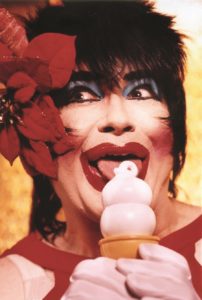“It’s not really a drag show — it’s more like a train wreck,” says one audience member to another minutes before Dina Martina takes the stage at the Crown & Anchor.
Martina comes out wearing a neck brace. (What happened? She slipped in cat puke.) She is still brushing her hair, all the while panting and gyrating, lipstick smeared all over the lower half of her face. The projector isn’t properly set up, so the default “Vivitek” logo is bouncing around the screen, and the back of Dina’s dress is fully unzipped. All the while, she isn’t singing so much as fluctuating between shrieks and bellows.
The whole mess is completely, absolutely perfect.

Martina’s show, “Chariots of Failure,” runs Wednesdays through Sundays at 7:30 p.m., poolside at the Crown, throughout the summer. A self-described “horrible singer” and “terrible dancer” (both true), Martina has performed her oddball act since 1989, when she first unleashed it on Seattle. In the three decades since, she has gained an army, or perhaps a cult, of followers (John Waters, Whoopi Goldberg, and Bette Midler among them) for her nonsensical, visceral, manic performances.
How to describe a drag show that defies description? Maybe like this: watching “Chariots of Failure” feels like fireworks are going off directly in your face. Instead of taking in the spectacle — colors, sparkles, illumination — you’re deafened by the noise, burning hot, and drowning in soot that remains once the beauty has faded. But Martina prompts you to enjoy all of this. Can’t awful, ugly things be their own source of entertainment?
Which is to say, Martina’s act might surprise you: She’s not one for the glitz and glam, for stilettos (two minutes into the show, she exchanges them for flats, breathing a sigh of relief), or for intricate lighting design and dozens of costume changes. She is, instead, flailing onstage — slowly losing her mind and warping yours.
Like that of her colleague Varla Jean Merman, Martina’s latest show focuses heavily on the pandemic that we may or may not have put behind us. She says that, as Covid raged on, she “hoped for the best, prayed for the worst” and ate her weight in Flintstones gummy vitamins. She also tells us about the “pharma to table” vaccine she received a few months ago.
Over the past year and a half, Martina had over 100 shows canceled while performing fewer than a dozen, many of them over Zoom. She describes those performances as “emotionally distanced.” During the show, a chorus of coughs echoes through the audience. (Provincetown is currently seeing a spike in Covid cases.) Martina shrugs and says she will “probably be back performing tomorrow — or maybe not.” The audience lets out an uncomfortable laugh.
Martina’s humor is not about the punchline — it’s about the stumbles and fumbles that lead up to it. She prioritizes cadence over content, twisting her voice in unexpected ways, mispronouncing more words than she gets right. “Provincetown” becomes the Frenchified “Provence-town,” “Los Angeles” becomes “Lozenge.” It’s child’s humor, but the audience eats it up, tapping into that base part of themselves, letting their guard down. Because isn’t that why so many flock to Provincetown, which Martina refers to affectionately as a “delightful little ashtray of a town?”
Perhaps the most moving part of Martina’s show is her cover of the Weather Girls’ “It’s Raining Men,” which she changes to “It’s Raining Them,” referring to the increasing number of people who are shedding the binary gender paradigm like snakeskin, proudly telling their friends and family to address them with different pronouns.
“It’s one of the most beautiful things that’s happened in my lifetime,” says Martina, with no silly intonations or mispronunciations. “Young people are sucking in every iota of joy they can before this planet sinks like the Titanic. I think it’s one of the most beautiful things. I really do.”
